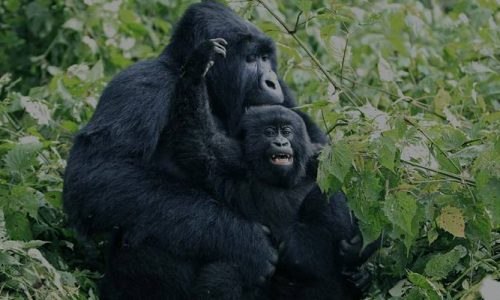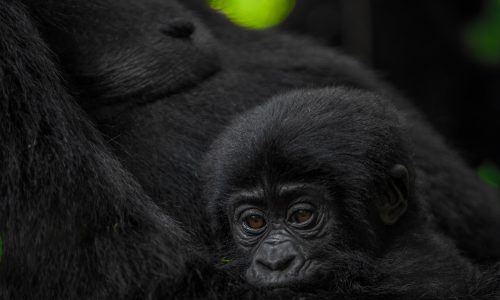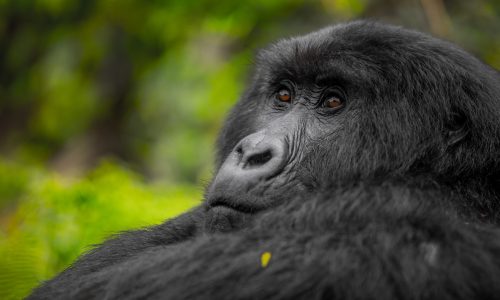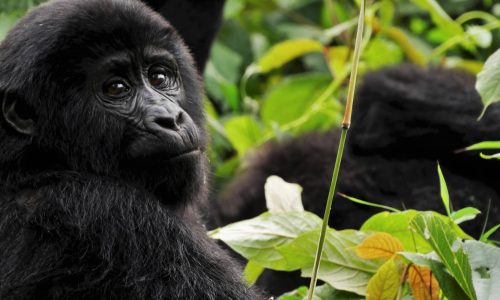Mountain Gorillas
A Comprehensive Guide to Trekking and Conservation
Mountain gorillas (Gorilla beringei beringei), among the most majestic and endangered creatures on Earth, thrive in the dense, high-altitude forests of East and Central Africa. These intelligent and social primates have become symbols of conservation and ecotourism, drawing thousands of visitors annually to their protected habitats in Uganda, Rwanda, and the Democratic Republic of Congo (DRC).
Key Facts About Mountain Gorillas
1. Habitat and Range
Mountain gorillas inhabit the volcanic slopes of the Virunga Massif and the dense forests of Bwindi. They live exclusively in:
- Bwindi Impenetrable National Park (Uganda) – Home to over half the world’s mountain gorillas.
- Mgahinga Gorilla National Park (Uganda) – Part of the Virunga Massif.
- Volcanoes National Park (Rwanda) – Known as PNV, a significant conservation area.
- Virunga National Park (DRC) – The southern sector of this UNESCO World Heritage Site.
2. Population
The current global population is estimated at around 1,063 individuals, divided into two distinct subpopulations:
- Virunga Subpopulation: Spanning Rwanda, Uganda, and the DRC in the Virunga Massif.
- Bwindi Subpopulation: Primarily located in Uganda’s Bwindi Impenetrable Forest and parts of DRC’s Sarambwe Nature Reserve.
Physical and Behavioral Characteristics
Physical Traits
- Size: Adult males (silverbacks) can weigh up to 200 kg (440 lbs) and stand 1.5 to 1.8 meters (5–6 feet) tall.
- Fur: Mountain gorillas have thicker, denser fur compared to other great apes, enabling them to survive cold temperatures at elevations between 2,000 and 4,000 meters (6,560–13,120 feet) above sea level.
Behavior and Social Structure
- Diet: Primarily herbivorous, consuming a diet of leaves, stems, fruits, and bamboo shoots.
- Troops: Live in groups led by a dominant silverback, with females, juveniles, and younger males.
- Communication: Use a mix of vocalizations, body language, and facial expressions to interact.
Adaptation Challenges
Human encroachment has pushed mountain gorillas further up into the mountains, where they endure harsher conditions.
Where to See Mountain Gorillas
1. Uganda
Bwindi Impenetrable National Park
- Home to more than half of the global mountain gorilla population.
- Known for its diverse biodiversity and challenging trekking trails.
Mgahinga Gorilla National Park
- A smaller park but part of the greater Virunga Massif.
- Offers a serene trekking experience and opportunities to visit the Batwa people, an indigenous forest community.
2. Rwanda
Volcanoes National Park (PNV)
- Famous for Dian Fossey’s groundbreaking gorilla research.
- Conveniently located near Kigali, making it ideal for short trips.
3. Democratic Republic of Congo (DRC)
Virunga National Park
- Known for its affordable permits and unique landscape.
- A more adventurous option for experienced travelers.
Gorilla Trekking: An Unforgettable Experience
1. What to Expect
- Duration: Trekking can take 2 to 8 hours depending on the gorilla family’s location.
- Group Size: Limited to 8 trekkers per group to minimize human impact.
- Viewing Time: Once located, visitors spend a maximum of one hour observing the gorillas.
2. Gorilla Permits
- Uganda: Recently increased from $700 to $800 as of July 2024.
- Rwanda: $1,500.
- DRC: $400, making it the most budget-friendly option.
3. Tips for Trekking
- Fitness: Prepare for strenuous hikes in high-altitude, forested terrain.
- Clothing: Wear long-sleeved shirts, sturdy boots, and waterproof gear.
- Guidelines: Follow all instructions from guides, including maintaining a 7-meter distance and avoiding direct eye contact with silverbacks.
Conservation of Mountain Gorillas
Mountain gorillas remain one of the world’s most endangered species. However, conservation efforts have seen their population rise steadily over the last two decades.
Key Conservation Initiatives
- Anti-Poaching Efforts: Continuous patrols by rangers to prevent poaching and habitat destruction.
- Disease Prevention: Strict health protocols to prevent transmission of human diseases to gorillas.
- Community Engagement: Revenue-sharing programs like those in Rwanda encourage local communities to protect gorillas.
Challenges
- Habitat Encroachment: Agricultural expansion reduces forest cover.
- Political Instability: In regions like the DRC, conflicts pose significant risks.
Conservation of Mountain The Role of Tourism in ConservationGorillas
Positive Impact
Tourism generates significant revenue, a portion of which is reinvested into conservation projects and community development. Trekking fees help fund anti-poaching initiatives and medical care for gorillas.
Responsible Tourism Practices
- Book with licensed operators like Gorilla Quest Africa.
- Follow trekking guidelines to minimize environmental impact.
Cultural and Community Experiences
Gorilla trekking is often complemented by cultural activities:
- Batwa Cultural Tours: Learn about the traditions of the Batwa people in Uganda and Rwanda.
- Local Handicrafts: Support artisans by purchasing woven baskets, carvings, and other souvenirs.
Cultural and Community Experiences
Gorilla Quest Africa offers expertly curated tours that combine thrilling wildlife encounters with cultural immersion. With a commitment to sustainability, Gorilla Quest Africa ensures every trip supports conservation and uplifts local communities.




Encountering mountain gorillas in their natural habitat is a profound experience that connects you to one of the planet’s most remarkable species. With ongoing conservation efforts, trekking opportunities in Uganda, Rwanda, and the DRC continue to inspire travelers and safeguard the future of mountain gorillas.
Ready to plan your gorilla trekking adventure? Reach out to Gorilla Quest Africa and let us craft an unforgettable journey.
Have Any Question or need assisatance planning your next adventure?
Contact Gorilla Quest Africa:
